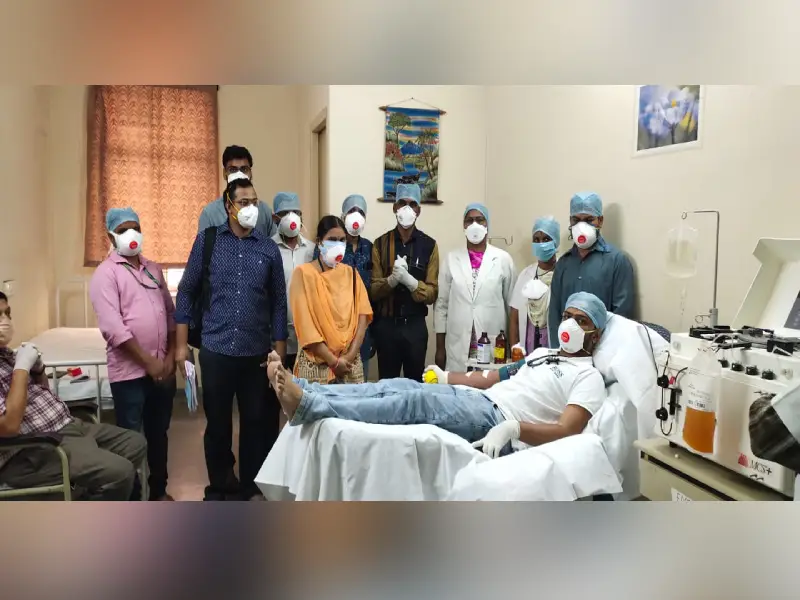In Telangana only 19 cured patients volunteer for plasma donation
By Coreena Suares
Hyderabad: Out of the 16,287 COVID patients discharged in Telangana, only 19 have come forward for convalescent plasma (donation) therapy as on July 7th. Fear of contracting the virus again, at the state-run COVID nodal center, is one reason behind the poor turn out, officials told Newsmeter .
The pandemic broke when Telangana reported its first case on March 2nd. Two months later, amid surge in new cases a young advocate from Warangal, Akhil Ennamsetty becomes the first cured patient to volunteer. In fact, he is among the ‘two’ patients who donated plasma twice. The other is a young MBA graduate from Hyderabad.
Akhil Ennamsetty, a lawyer from Warangal becomes Telangana's first donor for Convalescent Plasma therapy clinical trials, a treatment approved by ICMR for treating the critical COVID-19 patients.@AkhilEnnamsetty @MC_GWMC @TelanganaHealth @Collector_WGLU @HamaraWarangal pic.twitter.com/8einfVyFTu
— Thota Pavan (@ImPavanThota) May 11, 2020
[amp-tweet tweetid="https://twitter.com/ImPavanThota/status/1259804510207086592"]
Despite repeated appeals made by Dr Raja Rao- Gandhi Hospital Superintendent and regular phone calls, only 17 others followed in a span of four months. This is much against the ICMR set clinical trial’s target of 25-50 plasma donors, sans time frame.
Speaking to Newsmeter, a doctor who requested for anonymity explained, “From each of the 19 donors, 500 ml of plasma was collected. This quantity (500 ml) helped transfused plasma to 2-3 COVID active patients. So far, none of the recipients have experienced any adverse reactions following the transfusion”.
The standard procedure is, each donor is subjected to 3 cycles of plasma donation. In each round the Apharesis machine separates the component. Around 150 -200 ml of plasma is collected per cycle depending on the hemoglobin levels. While concurrently, the blood is recycled back to the donor.
Donated plasma is transfused to active patients suffering from mild to moderate symptoms and not critical patients. Patient’s blood group besides other parameters are matched before transfusing the plasma.
“Based on the requirement only plasma is transfused. The patient is under observation from day zero ( before plasma) and every alternative day, post transmission” the doctor added.
This correspondent has learnt that PG doctors serving in the COVID ward has dialed around 100 cured patients but none turned out. “The standard answer is: 'I am out of station’, 'family is not approving’ and ' I don’t have time’. Some cite weakness and some don’t even take calls. This is even though they agreed to donate plasma at the time of discharge," said a doctor
Independent inquiries also revealed that six of the 32 cured patients, as mentioned by Hyderabad MP Asaduddin Owaisi, turned up to donate plasma. To recall on Eid, Owaisi had announced that 32 Tablighi Jamat returnees have agreed to donate plasma.
Unlike others, first donor Akhil. E tried to remove misgivings about the plasma donation. “There is no loss of Red Blood cells. Patients need to be told that by donating plasma they will not lose blood. Plasma will be regenerated within 48 hours. In the US and UK, those cured are donating every week. While in India it is once a month. The government hospital needs to create more awareness” Akhil said. He has also written to the government to set up a dedicated task force for Convalescent Plasma Therapy in Telangana.
Please set up a dedicated taskforce for Convalescent Plasma Therapy in Telangana #COVID19 #PlasmaTherapy@TelanganaCMO @Eatala_Rajender @KTRTRS @DrTamilisaiGuv @SmitaSabharwal @IndianRedCross pic.twitter.com/qvxmmVwU1N
— Akhil Ennamsetty (@AkhilEnnamsetty) June 27, 2020
[amp-tweet tweetid="https://twitter.com/AkhilEnnamsetty/status/1276793887181336577"]
What is plasma therapy?
The process is similar to donating blood. If somebody has recovered from Corona virus they will have developed antibodies against the virus. After two weeks of recovery, we conduct one test to confirm if the person is still negative. In this procedure, blood is drawn from the person and the serum is separated and screened for virus-neutralising antibodies. The serum, which is rich in antibodies, is then administered to a COVID-19 patient.
How effective is it?
Professor Rakesh Mishra, the director of Hyderabad's Centre for Cellular and Molecular Biology (CCMB), told NewsMeter, "Plasma transfer cannot be administered on a large scale. “About 200ml of blood has to be taken from a recovered person for plasma transfer. This means one recovered patient can transfer plasma to only one patient. Also, some people recover without the help of antibodies. Their blood also cannot be used. Hence, plasma transfer will be administered only to patients in critical conditions', he said.
To study the efficacy of plasma therapy in treating COVID-19 patients, the apex body for medical research in India, ICMR, has invited institutions to participate in a clinical trial of convalescent plasma therapy.
The method has earlier been tested on Ebola and other strains of Corona virus like SARS in 2003 and MERS in 2012 with varying levels of efficacy.